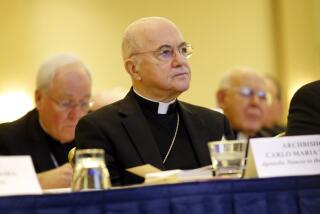Robert Sherwood Morse dies at 91; dissident Episcopal clergyman
Robert Sherwood Morse, a dissident clergyman who objected to changes in traditional Episcopalian practice and urged fellow religious conservatives to leave a mainstream he likened to the Biblical “fleshpots of Egypt,” has died. He was 91.
Morse, who helped found and was selected as archbishop of what became known as the Anglican Province of Christ the King, died of pancreatic cancer May 28 at his home in Berkeley, according to Monty Stanford, a spokesman for the San Francisco-based organization.
Though small next to the mainstream Episcopal Church of the USA, the province has 46 parishes across the U.S., including 16 in California.
One of a number of breakaway groups, it had its roots in dissatisfaction expressed by Morse and other clergymen over what they saw as unsettling theological changes in the church to which they had committed themselves. In 1976, Morse told the Times that a million congregants had left Episcopalianism in the previous 10 years, upset by prospective revisions in the 1928 Book of Common Prayer and the possibility of ordaining women as priests.
The church approved female priesthood at a Minneapolis conclave in September 1976. The following year, Morse and other outraged Episcopalian leaders gathered more than 1,700 followers in St. Louis to lay the groundwork for a new church.
In a fiery sermon titled “The Long March into the Desert,” Morse told the group that the mainstream church had “abandoned the family and given its people stones and scorpions instead of bread to strengthen men’s hearts.”
“Our Church has been stripped over the years, in general convention following general convention, of any and all moral standards with which we can deal with the gamut of modern moral issues running from divorce to demonology!”
Morse faced discipline in ecclesiastical courts for his opposition to women priests — a position, he said in interviews, that did not reflect his views on women’s rights.
“What people don’t understand about the whole concept of the ordination of women is that it was never a question of equality but of theology,” he told Insight magazine in 1992. “The notion has always been of Jesus as the bridegroom and the church as his bride. You simply cannot have Jesus as the bride.”
Born April 10, 1924, in San Francisco, Morse grew up in the suburb of Burlingame and served in the Army Signal Corps in World War II.
A graduate of Pacific College (now University of the Pacific) in Stockton, he attended Seabury-Western Theological Seminary in Chicago and was ordained a priest in 1951.
As a student, he got to know Alan Watts, an Episcopal priest who left the church and later became a popular author and lecturer on Zen Buddhism.
In his 1972 memoir, “In My Own Way,” Watts praised Morse for his “irrepressible and perfectly unmalicious humor” and described him as “one of the few people who genuinely believe that God is exuberant love.”
Morse held posts at churches in the Bay Area, and established Episcopal chaplaincies at both Stanford and UC Berkeley. He also helped found the York School, an Episcopal prep school for boys in Monterey, and from 1966 to 1984, was rector of St. Peter’s Church in Oakland.
He also established a seminary in Berkeley and rented rooms to members of the university’s crew team. Five weeks before his death, he ceremonially poured champagne over the team’s new boat, which was named in his honor.
Morse is survived by his wife, Nancy Burkett Nickel, whom he married in 1957; children Nina Gladish and John Nickel; nine grandchildren; and four great-grandchildren.
Twitter: @schawkins
More to Read
Start your day right
Sign up for Essential California for the L.A. Times biggest news, features and recommendations in your inbox six days a week.
You may occasionally receive promotional content from the Los Angeles Times.







